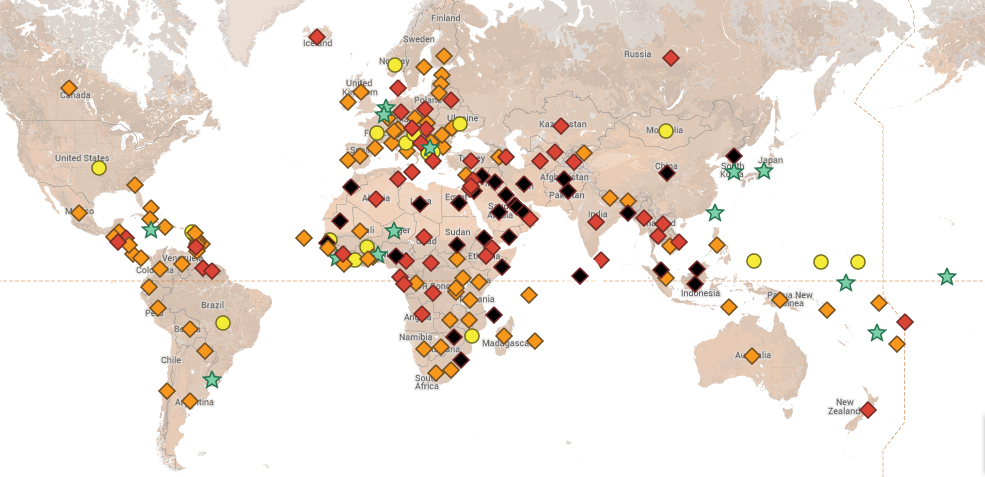2013 Edition Now Available, and it Covers Every Country
The 2013 edition of the Freedom of Thought report is hugely expanded. It now examines every country in the world for legal discrimination and human rights violations which specifically affect atheists, humanists and the non-religious. (The 2012 edition contained 60 countries.)
You can download it here.
In addition the 2013 edition introduces a new rating system.
The Freedom of Thought report by the International Humanist and Ethical Union, IHEU documents widespread discrimination by governments in every region. Now that we can see all the countries side by side, the situation becomes even clearer. That’s the good news. But the situation itself is the bad news.
- Atheists can face death sentences for declaring their atheism in 13 states (all these are formally Islamic states)
- In 39 countries the law mandates a prison sentence for blasphemy (including 6 western countries)
- The non-religious are discriminated against, or outright persecuted, in the great majority of countries of the world
Issues from children forced to pray in school classrooms, to the most “Grave Violations” are considered in the report’s comprehensive new rating system.
Death for unbelievers
12 countries in Africa, 9 in Asia, and 10 in the Middle East, were given the worst rating for committing “Grave Violations”. Some of these governments were found to openly incite hatred against atheists, or authorities which systematically fail to prosecute violent crimes against atheists.
Furthermore, in 12 of the worst-offending states, religious authorities can put atheists to death for the crime of “apostasy” (i.e. leaving religion).
Blasphemy
Around the world, the Report documents 55 countries with ‘blasphemy’ laws on the books, or other laws forbidding criticism or “insult” to religion. In 39 such countries the law mandates a prison sentence for blasphemers.
Three states, Pakistan, Saudi Arabia, and Iran, can execute “blasphemers”. In another three states, militant Islamists acting as religious authorities in some areas are also dealing out Sharia punishment including death for “offences” to religion: namely Al-Shabaab in Somalia, Boko Haram and other Islamists in Nigeria, and the Taliban in Afghanistan.
(Note, the figure of 55 countries with blasphemy laws is conservative, because it does not include all laws against “defamation of the religious”, for example. The Report includes as ‘blasphemy’ laws any legislation which criminalizes “insult” or “offence to religion” or which operate as de facto anti-blasphemy laws to restrict what should be legitimate expression: e.g. criticism, ridicule, satire. The Report does not count as anti-blasphemy laws legislation which is clearly intended only to proscribe genuine hate speech and which succeeds in that limit.)
Victims speak out
The report’s opening remarks this year come from two atheists accused of apostasy and blasphemy and now living in exile or in hiding. (The cases of both Alber Saber and Kacem El Ghazzali are also featured in the report).
In the opening remarks, Kacem and Alber write: “Freedom of thought and belief must not be compromised. When regimes violently attack people for their ideas and beliefs, all human rights suffer… In spite of international treaties and conventions, many states discriminate in subtler but important ways. And this has a global impact. Laws against “insulting” religion in relatively secure, relatively secular countries, for example, are not only analogues of the most vicious blasphemy laws anywhere in the world, but help to sustain the global norm under which thought is policed and punished.”
Blasphemy in western countries
In line with their words, several possibly unexpected nations come out rather badly on the scale of five classifications — which range upward in severity from “Free and Equal”, through “Mostly Satisfactory”, “Systemic Discrimination”, “Severe Discrimination”, to “Grave Violations”.
Four western countries are rated “Severe” because they can jail people for breaking laws prohibiting ‘blasphemy’ and other free speech on religion.
Those countries are Iceland (a sentence of jail for up to 3 months), Denmark (up to 4 months), New Zealand (up to a year), Poland (up to two years), Germany (up to three years) and Greece (up to three years). Jail time could be handed to someone who simply “blasphemes God” in the case of Greece, or “insults the content of other’s religious faith” in the case of Germany.
A global impact
It may seem strange to see some of these countries up there with Uzbekistan or Ethiopia (also rated “Severe”) but as Kacem and Alber say in the preface, these laws set a trend. Failure to abolish them in one place means they’re more likely to stay on the books in another place, where they can be disastrous. And even in the western countries with blasphemy-type laws there is evidence that they chill free expression, and in some countries, like Greece and Germany, people are actually prosecuted and convicted and do jail time under these laws.
All those six western states outlawing blasphemy only got a Severe rating because of that law. They might not have a completely clean slate, but they wouldn’t have a Severe rating if they abolished that law.
IHEU hopes the report will help shed light on how lesser but systemic discrimination in most countries privileges religion and that it will drive change on the worst violations.
Abolition of blasphemy is what the EU Guidelines on Freedom of Religion or Belief are pushing for, it’s what the UN Special Rapporteur on freedom of religion or belief wants: a global repeal of blasphemy to protect everyone’s right to convert. If these six countries can’t do it, what hope is there for countries that punish insults to religion with death?



